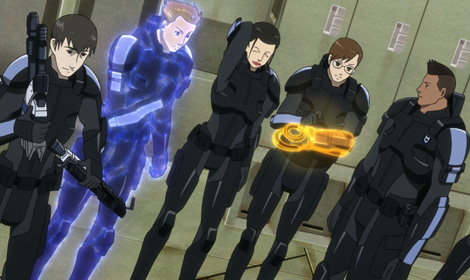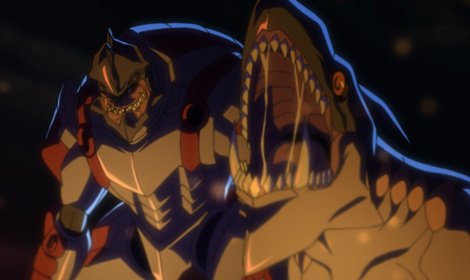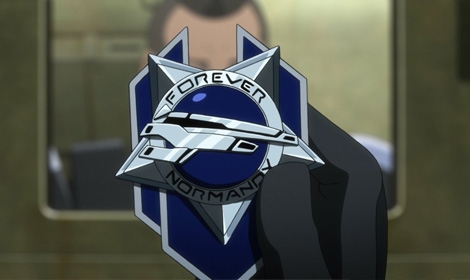Considering my lukewarm reception of Dragon Age: Dawn of the Seeker, I worked to keep an open mind for Mass Effect: Paragon Lost. When Jack Wall and Sam Hulick inspired music kicked in over images of nebulas during the intro, I felt a flutter of hope. However, as James Vega, voiced by Freddie Prince Jr., began rambling broadly about making tough decisions in words more suited for Blasto the Hanar Specter, the flutter was quashed, and I settled in for what was going to be a long ride. This movie contains spoilers for all three games, and it would be impossible to write a review without mentioning a few of them. Unlike most of T-Ono's reviews, if you don't want anything spoiled, I'd recommend leaving at this point. For everyone else, let's see what calibrations could have been made to Mass Effect: Paragon Lost.
Mass Effect is one of my favorite franchises of all time and one of my favorite stories ever told. Fans of the series expect, above all, high quality storytelling from anything involving the universe. Superb plot, character development, and world building are the driving forces behind the trilogy's cult following and commercial success, and any new story involving my favorite element zero-laced universe will be held up to stringent standards by the fans. Just ask William C. Dietz, author of the fourth Mass Effect tie-in novel, Mass Effect: Deception. Dietz's book disregarded numerous canonical items, even facts well established in the games' readily available encyclopedia. In response, fans spent hours analyzing every single aspect of the book and cataloged the inaccuracies on a public document. Whether you think this is an example of fan entitlement or consumer empowerment, it's clear that anyone playing in the Mass Effect sandbox will face considerable scrutiny.
As a fan of Mass Effect, I appreciated and enjoyed how true to the universe many of the small elements were. At one point, Vega takes a shield generator from the sniper in his squad so he can add it to his own armor to prepare for a direct assault. This nod to the armor customization feature of the games was satisfying because it's the type of thing I did as a player. At one point, Treeya, an Asari archaeologist who joins with Vega's squad, comments that Liara has fallen from grace in the scientific community because of her obsession with Reaper myths. I enjoyed the comment because it matches with Liara's shift from archaeologist to spy between Mass Effect and Mass Effect 2. Little moments like these pop up frequently throughout the movie, so fans will definitely be satisfied on that front.
"Why Vega?" is the first question any fan of the series is going to ask when they hear about Mass Effect: Paragon Lost. The movie features Vega roughly two or three years before Mass Effect 3 saving a colony from a Collector ship. It's difficult to get fans excited about a character they don't care about in a situation they've played before, so before considering anything else, Paragon Lost is beset by its premise. If new information about the franchise was revealed, the character choice and plot might not have been a big issue, but the entire movie is set up to explore Vega as a soldier and leader. Unfortunately, it flounders as such.

Exploring Vega's character while he fights the Collectors isn't an inherently bad concept, but the whole movie felt like a lifeless shuffle from one plot point to the next. The scene where the Collectors arrive to attack the colony should have been filled with tension and awe, but it happens without any foreshadowing and doesn't convey panic, urgency, or danger. Instead, I thought, "Oh hey, the bad guys are here." All of the elements necessary for good conflict and drama were there: Vega has a love interest, the doomed colonists become his extended family, and he struggles to reconcile that he isn't as skilled as his hero, Commander Shepard. Because the pacing is so monotonous and very little time is spent building each character, it's difficult to care about them and how they deal with their plights.
It's difficult to determine who's really at fault here: the director, the writer, or the producers? The script for Mass Effect: Paragon Lost seems competently written, but it was difficult to really enjoy what was happening throughout the movie. Similar to Dragon Age: Dawn of the Seeker, the story felt too simplistic and overladen with obtuse messages. Henry Gilroy, the writer, has a commendable filmography as a script writer that stretches back to 1992, but the majority of his work involves cartoons aimed at children and teenagers. While the Mass Effect video games enjoy the talent and variety of an entire team of writers, the quality, tone of writing, and maturity should be matched in tie-ins, especially one that explicitly deals with the themes of the games. To his credit, Gilroy got far closer to the brand mark than Dragon Age: Dawn of the Seeker, but throughout the entire movie I couldn't shake the feeling that I was watching something meant for an entirely different age group.
The director, Atsushi Takeuchi, has a similar amount of experience as Gilroy and shares as much of the burden for how the movie turned out. Takeuchi has been working in various art departments within the anime industry since 1993, but he's only directed episodes of Star Wars: The Clone Wars and Tenchi Muyo, both of which are fairly straightforward action shows meant for kids and young adults. While Takeuchi couldn't have modified the script to any large degree, his choices for how individual scenes were paced and animated contributed to the general monotony and tonal flatness of Mass Effect: Paragon Lost. There were many points throughout the movie which would have benefited a great deal from a bit more artfulness in presentation for diversities sake if nothing else.

The central conflict of Paragon Lost is its greatest strength and its greatest weakness. Vega's most crucial decision is whether or not he should evacuate colonists from inside a Collector ship or save his Asari love interest, Treeya, and information critical to stopping the Collectors. This choice is incredibly hard to make and it's one of my favorite scenes in the entire movie, but everything leading up to it had me scratching my head in confusion. In Mass Effect 2, Shepard spends the entire game developing tools and strategies to fight, and eventually stop, the Collectors. By the end of the game, they're no longer a threat. While I watched characters develop a cure for the Collector's paralyzing agent and discover that they were actually modified Protheans working for the Reapers, I kept thinking about how fruitless all of it was. Like I mentioned before, I was watching a character I had no strong feelings toward go through the motions of what I'd spent roughly thirty hours playing in Mass Effect 2.
What I loved about the conflict was James' reaction to and coping with the decision he made. Every scene from when James lets the Collector ship crash to when he finds himself on his hands and knees in the rubble of the colony was intense, well written, and well directed. The disjointed sequence conveys how broken James feels, and the Dutch angles and color choices let the audience know how overwhelming and surreal the situation is for him. Aside from their impressive records, this scene proves that Gilroy and Takeuchi can produce quality moments, so it's a mystery as to how the rest of the film unraveled so thoroughly.
As a piece of animation, Mass Effect: Paragon Lost can be commended for hitting the brand mark, but a few of the design decisions and overall quality were dubious. Fans will definitely appreciate the look of nearly everything in the movie, especially when they can recognize some of their favorite guns, but between the strange angles of the Krogan's faces to the size of the Collectors, the look of the entire production just feels a bit off. Other than that, it was frustrating to see choppy animation on a feature length production. While all animation studios need to cut corners at times, there were too many scenes that seemed to be missing more than a few frames.
At twenty dollars for the discs, it's hard to recommend this movie to fans of anime or even of the games. The movie offers no new information about the universe, it struggles as a character drama, and it feels very generic as a sci-fi action movie. The animation isn't the best quality, and it feels like corners were cut in too many places. The music did a great job of emulating the tracks from the games, but I would recommend purchasing the soundtrack before buying the movie. I would suggest Paragon Lost to anyone who wants to process as much Mass Effect paraphernalia as humanly possible, but to no one else. If you want good action, science fiction, or characterization, you can find it elsewhere.

What I loved:
- Vega’s internal conflict
- Direction and writing of the final scenes
- Music
- Stays true to the Mass Effect universe
What I hated:
- Monotonous pacing
- Generic action
- Uninteresting plot
- Flat characterization
Disclosure: A review copy was provided by the distributor
Images copyrighted: FUNimation/BioWare/T.O Entertainment

